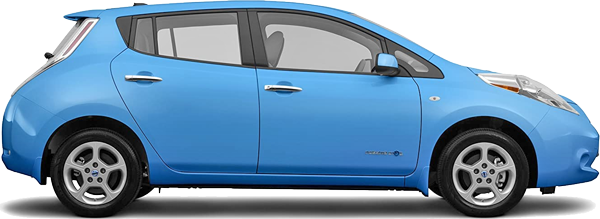The Comparative Analysis :
Nissan Leaf 30 kWh (15 - 17) vs. Hyundai i30 1.6 CRDi Automatic (12 - 15)
€ 31,300

€ 22,400

€ 31,300
Base Price ⓘBase price of a new vehicle with standard equipment in Germany at market launch.
€ 22,400
ⓘBase price of a new vehicle with standard equipment in Germany at market launch. Price Info
Vehicle Dimensions
The dimensions of these vehicles differ considerably. The Nissan Leaf (30 kWh) is 14.5 cm longer, 1 cm narrower and 8 cm taller than the Hyundai i30 1.6 CRDi.
Nissan Leaf (30 kWh)
Hyundai i30 1.6 CRDi
1550
1770
1970
1470
1780
2050
1770 mm
Width
1780 mm
1970 mm
Width Incl. Mirrors
2050 mm
1550 mm
Height
1470 mm
2700
4445
2650
4300
4445 mm
Length
4300 mm
2700 mm
Wheelbase
2650 mm
Vehicle Weight
Nissan Leaf (30 kWh)
Hyundai i30 1.6 CRDi
1605 kg
Kerb Weight
1385 kg
1970 kg
Gross Vehicle
Weight
Weight
1940 kg

Weight Difference:
220 kg
13.71 %

General
Nissan Leaf (30 kWh)
Hyundai i30 1.6 CRDi
ZE0
Generation
GD/GDH
Hatchback
Car Body Style
Hatchback
Electricity
Fuel Type
Diesel

Front-wheel drive
Drive
Front-wheel drive

1-speed automatic transmission
Transmission
6-speed automatic transmission
Engine
Nissan Leaf (30 kWh)
Hyundai i30 1.6 CRDi
Electrically excited synchronous motor
Engine Type
Straight-four diesel engine with turbocharger
0
Valves
4
0
Cylinders
4
0 CC
Engine Capacity
1582 CC
108 bhp
at 0 rpm
Power
108 bhp
at 4000 rpm
Nissan Leaf (30 kWh)
108 bhp
108 bhp
Hyundai i30 1.6 CRDi
254 NM
at 0 rpm
Max. Torque
260 NM
at 1900 rpm
Nissan Leaf (30 kWh)
254 NM
260 NM
Hyundai i30 1.6 CRDi
Performance
Nissan Leaf (30 kWh)
Hyundai i30 1.6 CRDi
89 mph
Maximum Speed
112 mph
11.5 sec
Acceleration 0 to 62 mph
12.3 sec
62 mph
62
mph
mph
160 m
0.000 sec

Nissan Leaf (30 kWh)
62 mph
62
mph
mph
171 m
0.000 sec

Hyundai i30 1.6 CRDi
▶ REPLAY
14.86 kg/bhp
Weight-to-Power Ratio
12.82 kg/bhp
Nissan Leaf (30 kWh)
14.86 kg/bhp
12.82 kg/bhp
Hyundai i30 1.6 CRDi
Fuel Economy / Emissions
Nissan Leaf (30 kWh)
Hyundai i30 1.6 CRDi
Fuel Economy
24 kWh✽
( 166 MPGe ⓘ Miles per gallon petrol equivalent (MPGe) is a measure of the average distance traveled per unit of energy consumed. MPGe, specified in miles per imperial gallon (~4.546 litres), is used to compare the energy consumption of vehicles that use different energy sources.)
combined ✽ per 100 miles
51 mpg
( 58 MPGe ⓘ Miles per gallon petrol equivalent (MPGe) is a measure of the average distance traveled per unit of energy consumed. MPGe, specified in miles per imperial gallon (~4.546 litres), is used to compare the energy consumption of vehicles that use different energy sources.)
Nissan Leaf (30 kWh)
166 MPGe
58 MPGe
Hyundai i30 1.6 CRDi
No data
city
39 mpg
No data
motorway
63 mpg
30 kWh
Fuel Tank Capacity
53 L
124 mi
Range
599 mi
Nissan Leaf (30 kWh)
124 mi
599 mi
Hyundai i30 1.6 CRDi
Environmental Impact
48.8 kWh
Total Energy Consumption
per 100 miles ⓘThe total energy consumption per 100 miles is the amount of energy consumed by a vehicle when burning fuel or using electricity per 100 miles (final energy), and the energy required to produce the appropriate amount of fuel or electricity (primary energy).
per 100 miles ⓘThe total energy consumption per 100 miles is the amount of energy consumed by a vehicle when burning fuel or using electricity per 100 miles (final energy), and the energy required to produce the appropriate amount of fuel or electricity (primary energy).
113.1 kWh
Nissan Leaf (30 kWh)
48.8 kWh
113.1 kWh
Hyundai i30 1.6 CRDi
Elektrofahrzeug
Emission Standard
Euro 5
0 g/km (NEFZ)
CO2 Emissions
145 g/km (NEFZ)
Practical Convenience
Nissan Leaf (30 kWh)
Hyundai i30 1.6 CRDi
5
Doors
5
5
No. of Seats
5
365 kg
Maximum Payload
555 kg
370 L
Boot Capacity
378 L








720 L
Boot Capacity (Seats Down)
1316 L









